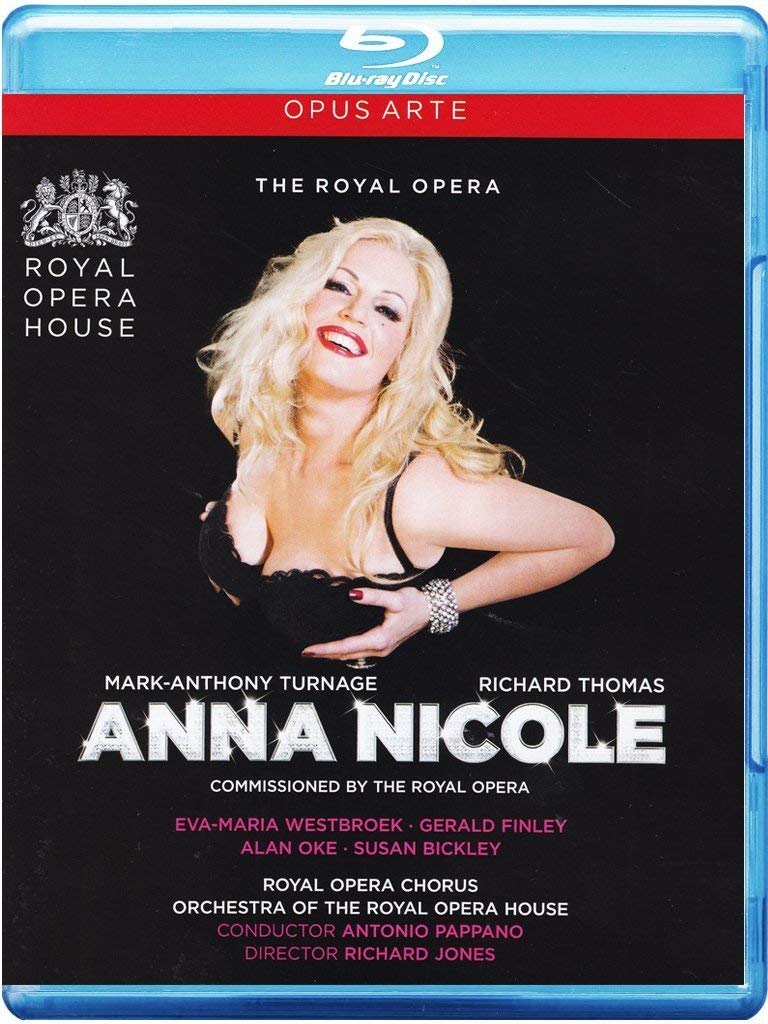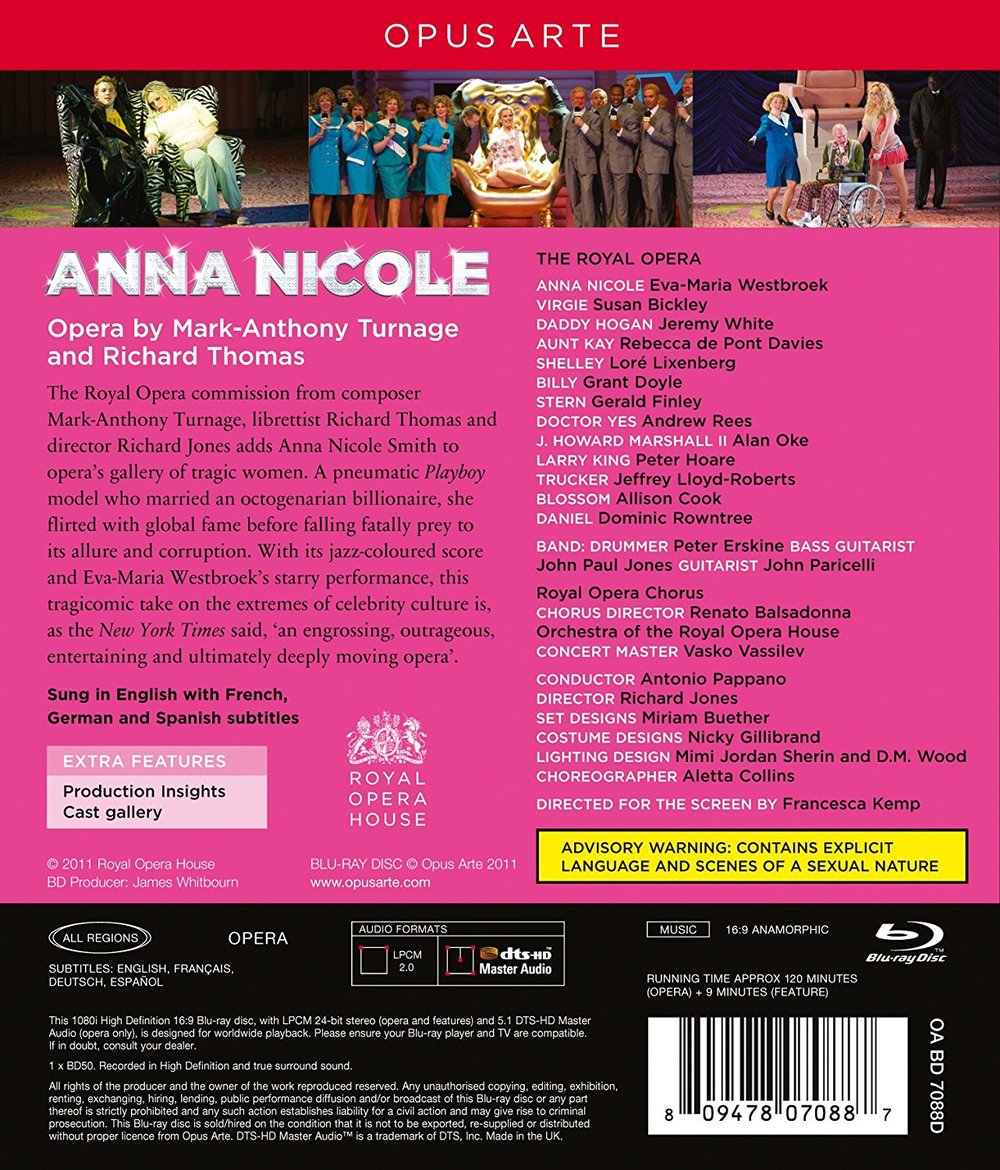

Mark-Anthony Turnage Anna Nicole opera to a libretto by Richard Thomas. Commissioned by The Royal Opera. Directed February 2011 as a world première by Richard Jones at the Royal Opera House. Stars Eva-Maria Westbroek (Anna Nicole), Wynne Evans (Mayor of Mexia), Damian Thantrey (Roy Fiction, Deputy Mayor of Mexia), Susan Bickley (Virgie), Jeremy White (Daddy Hogan), Rebecca de Pont Davies (Aunt Kay), Loré Lixenberg (Shelly), Grant Doyle (Billy), Gerald Finley (Stern), Allison Cook (Blossom), Yvonne Barclay, Katy Batho, Amanda Floyd, Amy Catt (Four Lap Dancers), Jeffrey Lloyd-Roberts (Trucker), Dominic Peckham (Dominic Gent), Grant Doyle (Patron), Kiera Lyness, Marianne Cotterill, Louise Armit, Andrea Hazell (Meat Rack Quartet), Andrew Rees (Doctor Yes), Alan Oke (J. Howard Marshall II), Andrew Gilbert (Young Daniel), Dominic Rowntree (Teenage Daniel), ZhengZhong Zhou (Runner), and Peter Hoare (Larry King, a television ajournalist). Also features onstage band members Peter Erskine (Drummer), John Paul Jones (Bass Guitar), and John Parricelli (Guitar). Antonio Pappano conducts the Orchestra of the Royal Opera House (Concert Master Vasko Vassilev) and the Royal Opera Chorus (Chorus iDirector Renato Balsadonna). Sets by Miriam Buether; costumes by Nicky Gillibrand; lighting by Mimi Jordan Sherin and D.M. Wood. Directed for TV by Francesca Kemp. We can't be sure, but we think the recording presented in this title was substantially or entirely shot on the opening night of February 17, 2011. Sung in vulgar American English. Released 2011, disc has 5.1 dts-HD Master Audio sound. Grade: B
This is the story of a real-life tragedy---a modern "operatic" death! It's a worthy successor to the tragedies of "La Traviata," "La Boheme," and "Manon" in that it's a rags to riches story which disintegrates into drug abuse and a sad, lonely demise.
The staging is absolutely brilliant with a superbly choreographed chorus. In addition to Anna Nicole, a lap-dancing, breast-enhanced Playmate of the Year and wife of an oil magnate 60 years her senior, we meet the equally famous TV personality Larry King and a bevy of sycophants seeking part of the action. The media is constantly present throughout the show, reflecting the real Anna Nicole's love/hate relationship with the press and TV. This is cleverly portrayed with people constantly thrusting microphones up to Anna's mouth hoping to catch a few more pearls of her ephemeral chatter and later by a number of rather disquieting dancers dressed entirely in black who have TV cameras instead of heads. They weave in and out of the action, prying, spying and recording everything until they zip her up in a black body bag.
The music by Mark Anthony Turnage is highly contrasted, sometimes as brazen as Anna herself and then quite lyrical, even tender. The libretto, by Richard Thomas (of 'Jerry Springer, the opera' fame) has a masterful use of words, although you really are better off having the English subtitles (unless you are already a master of Texas slang and pronunciation).
This show certainly has something for everyone, and it will appeal to people who may be put off by more conventional operas. Even those who do like the genre cannot fail to be impressed by this mixture of over-the-top brashness and the sheer pathos of this girl and her story.
There are a couple of downsides however. First of all, Opus Arte seems to have given up the practice of showing how long each track - and even each act - lasts in the booklet, which seems a little strange. Also, the sound seems to lack the relief we have got used to on HDVD discs. It also appears to be recorded at a lower level than usual. But even these minor quibbles cannot take away the fact that this is one of the most original, zesty, and enjoyable shows you're ever likely to see in an opera house. Go for it!
This was shown to the L'OperaDou jury, who gave it a "B" grade used above---not bad for a brash contemporary opera laced with vulgarities. Now for some screenshots.
Anna relates her life story to the press in flashback mode from her youth to death. At some ill-defined point in the story the flashback is over and the press characters become part of the story. We first see Anna as a pitiful single mom with no marketable education. Our first and second shots show her opening line (which is also her last line):
Anna grew up in the hick town of Mexia, Texas, the kind of place that most kids dream of escaping. The next 4 shots demonstrate just how edifying and instructive Blu-ray technology can be to us as viewers (while Anna explains her first youthful goal):
Eventually, Anna got on the south bus to Houston (she missed the bus north to Dallas, where this website is based). The big city gave Anna a shot at the exciting life of an entertainer:
Anna getting on-the-job-training:
But Anna didn't get many tips. She had to improve her appearance by seeking plastic surgery. Here other such patients sing a lament of the breastless masses:
Doctor Yes gives Anna all her options:
Anna goes for the Panamax model. This will turn out to be the most important decision of her life. With her new figure she becomes the topless sensation of Houston. (She also develops chronic back pain.) But it all proves to be worthwhile when she meets Mr. Marshall, an oil billionaire fracking more fun out of his 80s:
The future family: the little boy is Daniel, Anna's son from her first marriage. You can see that Daniel has one household chore---to dispense pills to his mom. Of course, he will eventually dispense them to himself also:
Anna is inflamed by the prospects of getting access to Marshall's money:
But Vergie, Anna's mom (who is some kind of law enforcement officer), understands that Anna (not Marshall) is the one being exploited:
Vergie's efforts to stop the marriage are ignored:
Next the partying starts:
Marshall enjoys the party life:
Marshall's bodyguards and nurses can protect him from just about everything except himself. Soon he parties himself to oblivion. This leads to an ugly scene at the funeral:
Although Marshall was an astute lawyer, his estate plan was shoddy. This led to epic estate litigation that got all the way to the Supreme Court of the United States at one point. Anna and her lawyer/lover Stern discuss this on the Larry King TV show:
Daniel is grown now, but he's a strange case. He hardly ever talks and spends all his days fiddling with prescription medicines and other drugs for his mom and himself. But he remains the one thing that Anna truly loves (other than her dogs):
Daniel dies from a drug overdose. This will also be a death blow to Nicole, who falls into unrestrained gorging on food and drugs:
Anna's final aria:
Anna goes into her death swoon. The cameramen zip up her bodybag:
These screenshots only give the highlights of an opera that itself leaves out a lot about Anna. In real life she was a more beautiful and capable woman than you might think from the way she is shown here. Anna's story is interesting on its own. Further, Anna stands as a proxy for long line of American talents who achieved early celebrity and then died young from self-abuse.
Update:
The day after the opening show, AN was savagely attacked by Andrew Clark in the important British newspaper, The Financial Times. He accused the Royal Opera House of wasting resources on a show full of "lurid doggerel" that is really a musical that should play in a smaller theater. Well, one can argue that doggerel is what the subject calls for rather than blank verse in iambic pentameter. And now I understand why Turnage in the bonus extra declares that the vast outlandishness of Anna's story calls for full opera treatment with a big orchestra and chorus---this was the Turnage reply to the challenge from Clark.
Anne Midgette also criticized AN in The Washington Post saying that the creators "documented Anna's life with dogged persistence, but they failed to provide one piece of information: why anyone should care." Well, I agree than Anna doesn't deserve outright sympathy because she never made a sacrifice. But doesn't this work teach a good lesson in the same vein as say, The Rake's Progress?
Other critics were kinder. Anthony Tommasini in the New York Times called AN "a musically rich, audacious and inexplicably poignant work." Arlo McKinnon wrote in the Opera News (December 2011 at page 80) that Anna Nicole Smith is America's Manon and concludes, ". . .the operatic assessment of [Anna's] life is both thorough and thought-provoking. It won't leave you feeling uplifted, but it is entertaining." In the Gramophone 2011 Awards Issue, the editor of the Super Audio Corner (probably Andrew Everard) had this to say (at page 147) about the Anna Nicole Blu-ray: "The sound quality is exemplary, and the whole enterprise is sensational in every sense of the word, not to mention really pushing a home cinema system to its limits."
So what's going to happen to AN? In April 2013 it played in Dortmund, Germany. The Brooklyn Academy of Music and the New York City Opera announced a co-production for September 2013. And the Estate of Anna Nicole Smith (Anna's minor daughter is a beneficiary) is threatening to sue! But in any event we already have a remarkably good HDVD that we can enjoy and dissect.
This work uses a lot of foul language. But I think you can't write anything about someone as vulgar as Anna Nicole with using authentic vernacular. And for each slug of bad language, I credit Thomas for coming up with something thoughtful and/or witty. But if you haven't already figured it out: this show is for adults, not kids.
I note that AN is an English, not an American, opera. For legal reasons, AN probably could not have been created in the United States. Instead, it was commissioned by the Royal Opera House (which wasn't too worried about getting sued by a Texas executor).
Both Turnage and Richard Thomas are English and speak with an accent that's sometimes hard for me to understand. But as an American who has lived in Texas for more than 30 years, I can say that Thomas did his research and wrote a libretto with astonishingly accurate local color and dialog. In that regard, this thing is a real hoot ("hooters" is Texas slang for large breasts). I also think Turnage and Pappano were remarkably successful in blending the big orchestra sound with American popular music and jazz.
So why did English people get behind this project? And why did they pursue it with such obvious glee while desecrating their opera house from attic to basement with images of an American soft-porn queen (well, actually images of the Dutch singer who played the role)? What's happening in our mother county? Here's my best guess: they finally found a way to get us back for 1776.
Here's an official clip:
OR
























